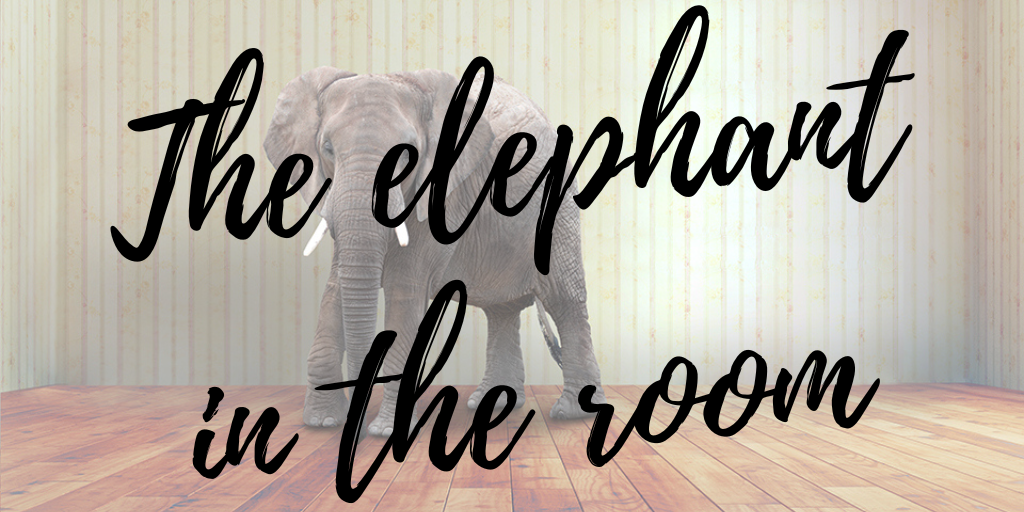The idiom “the elephant in the room” is a metaphor for a difficult or unpleasant topic that is obvious to everyone but is being ignored. The phrase is often used to describe a situation where people are reluctant to discuss a problem or issue because it is too sensitive or controversial. The phrase is a reminder that we should not ignore difficult or unpleasant topics, even if they are uncomfortable to discuss. By talking about these issues, we can start to find solutions and make progress.
Origin of “elephant in the room”
The exact origin of the phrase is unknown, but the first recorded use of the phrase “the elephant in the room” was in a 1814 fable by Ivan Krylov. In the fable, a man goes to a museum and sees an elephant, but he doesn’t notice it because he is too busy looking at all the other small objects on display. This story is thought to be the origin of the idiom, as it illustrates the idea of ignoring an obvious problem.
The phrase “the elephant in the room” didn’t become widely used until the 20th century. There was an article in the New York Times in 1902 about a political scandal, and the author used the phrase to describe the way that the scandal was being ignored by the media. In the 1950s, the phrase was used to describe the issue of racism in the United States. At the time, racism was a major problem in the country, but it was often ignored or discussed in hushed tones. The phrase “the elephant in the room” was a way of acknowledging the problem without directly addressing it.
The phrase “the elephant in the room” has continued to be used to describe a variety of difficult or unpleasant topics, such as poverty, war, and disease. The phrase is a reminder that even though we may not want to talk about these problems, they are still there and they need to be addressed. The phrase can also be used to describe a situation where people are simply unaware of a problem. Also, to describe a situation where people are aware of a problem, but they are afraid to discuss it.
“The elephant in the room” in culture
The phrase “the elephant in the room” has been used in a variety of works of literature and popular culture. For example, the phrase was used in the 1992 film “The Silence of the Lambs.” In the film, the character of Hannibal Lecter uses the phrase to describe the way that the FBI is ignoring the fact that there is a serial killer on the loose. In the 1995 film “Se7en,” the characters are forced to confront the “elephant in the room” when they discover a series of gruesome murders that are linked to the seven deadly sins. In the 2003 novel “The Kite Runner,” the protagonist is forced to confront the “elephant in the room” when he learns that he has been complicit in a crime that he has been trying to forget. The idiom has also been used in many other films and TV shows. In the movie “The Breakfast Club,” the students in detention are all aware of the social problems that divide them, but they are afraid to talk about them. In the TV show “Friends,” the characters often avoid talking about their problems, even though they are all aware of them. The idiom is frequently used.
The idiom has also been used in advertising and marketing campaigns. For example, a campaign for the National Eating Disorders Association used the idiom to raise awareness of eating disorders. The campaign featured a picture of an elephant in a room full of people. The elephant was meant to represent the eating disorder, and the people in the room were meant to represent the people who are aware of the problem, but who are afraid to talk about it.

The elephant in the room
Using “the elephant in the room”
Here are some examples of how the phrase “the elephant in the room” can be used in everyday discourse:
- “We can’t keep ignoring the elephant in the room. We need to talk about her drinking problem.”
- “I think it’s time to address the elephant in the room. Our marriage is in trouble.”
- “I’m not sure why everyone is so afraid to talk about it. It’s like there’s an elephant in the room that no one wants to acknowledge.”
- “I know it’s a difficult topic, but we have to address it. The elephant in the room is climate change, and we can’t ignore it any longer.”




Leave a Reply
Want to join the discussion?Feel free to contribute!